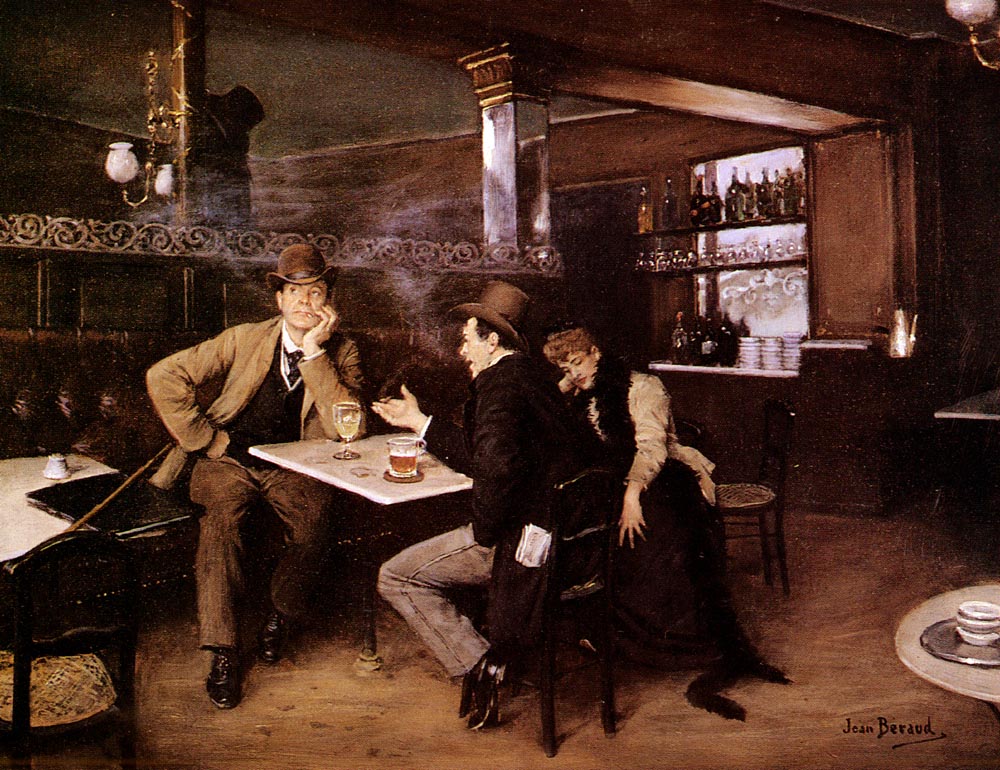Bistro on:
[Wikipedia]
[Google]
[Amazon]
 A bistro or bistrot , is, in its original
A bistro or bistrot , is, in its original

 The etymology is unclear, and is presumed to come from a regional word: bistraud, bistingo, bistouille, or bistrouille. The first recorded use of the word appears in 1884. A popular folk etymology of the word claims that it originated among Russian troops who occupied Paris following the Napoleonic Wars, as their officers or Cossacks allegedly shouted ''bystro'' (russian: text=быстро , translation=quickly) when they wished to be served quickly. This etymology has been discredited by some French linguists, as there is no attestation to the occurrence of this word until the end of the 19th century., '' Dictionnaire historique de la langue française'',
The etymology is unclear, and is presumed to come from a regional word: bistraud, bistingo, bistouille, or bistrouille. The first recorded use of the word appears in 1884. A popular folk etymology of the word claims that it originated among Russian troops who occupied Paris following the Napoleonic Wars, as their officers or Cossacks allegedly shouted ''bystro'' (russian: text=быстро , translation=quickly) when they wished to be served quickly. This etymology has been discredited by some French linguists, as there is no attestation to the occurrence of this word until the end of the 19th century., '' Dictionnaire historique de la langue française'',
Merriam-Webster definition
{{Authority control Restaurants by type French cuisine
 A bistro or bistrot , is, in its original
A bistro or bistrot , is, in its original Paris
Paris () is the capital and most populous city of France, with an estimated population of 2,165,423 residents in 2019 in an area of more than 105 km² (41 sq mi), making it the 30th most densely populated city in the world in 2020. ...
ian incarnation, a small restaurant, serving moderately priced simple meals in a modest setting. Bistros are defined mostly by the foods they serve. French home-style cooking, and slow-cooked foods like cassoulet
Cassoulet (, also , ; ; from Occitan and cognates with Spanish: ''cazoleta'' and Catalan: ''cassolet'') is a rich, slow-cooked stew containing meat (typically pork sausages, goose, duck and sometimes mutton), pork skin () and white beans ( ...
, a bean stew, are typical.
History
Bistros likely developed out of the basement kitchens of Parisian apartments where tenants paid for bothroom and board
Room and board is a phrase describing a situation in which, in exchange for money, Manual labour, labor or other considerations, a person is provided with a place to live as well as meals on a comprehensive basis. It commonly occurs as a fee at h ...
. Landlords could supplement their income by opening their kitchen to the paying public. Menus were built around foods that were simple, could be prepared in quantity and would keep over time. Wine and coffee were also served.
Today, bistros are mostly still part of the hospitality industry. They are often connected with hotel
A hotel is an establishment that provides paid lodging on a short-term basis. Facilities provided inside a hotel room may range from a modest-quality mattress in a small room to large suites with bigger, higher-quality beds, a dresser, a ref ...
s, bars, and pubs. They still often serve cheaper, simplified menus or menus that are not tied to a specific cultural cuisine.
Etymology

Dictionnaires Le Robert
Dictionnaires Le Robert () is a French publisher of dictionaries founded by Paul Robert. Its Petit Robert is often considered the authoritative single-volume dictionary of the French language.
The founding members of the editorial board were the ...
, 1998, .
See also
*Brasserie
In France, Flanders, and the Francophone world, a brasserie () is a type of French restaurant with a relaxed setting, which serves single dishes and other meals. The word ''brasserie'' is also French for "brewery" and, by extension, "the brew ...
, a slightly more formal French restaurant that may brew its own beer
*Parisian café
Parisian cafés are a type of café found mainly in Paris.
Purpose
Parisian cafés typically serve as a center of social and culinary life in Paris. They have existed since the 17th century and can serve as a meeting place, neighborhood hub, co ...
, centers of French social and culinary life
*Sidewalk cafe
The SideWalk Cafe was a music venue and restaurant/cafe in East Village, New York City founded in 1985. It became a known venue for its underground music scene, and in particular, was known as being the center for Anti-folk in the United Stat ...
References
External links
*Merriam-Webster definition
{{Authority control Restaurants by type French cuisine